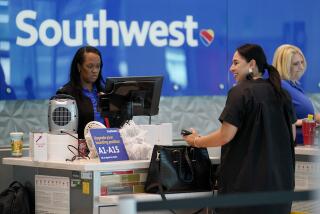Relief from sky-high fuel cost
- Share via
Even with occasional jumps in oil prices, fuel costs have fallen more than $40 a barrel in recent months, and that drop has emboldened the nation’s airlines with hopes of recovering from what has been a financial nightmare.
One analyst has even predicted that airlines could make a stunning reversal and post record profits next year thanks to a favorable mix of lower fuel expenses and higher fares.
But other analysts believe that the respite from sky-high fuel costs could be short-lived.
If the economy worsens, “airlines are going to be right back in the tank” with fewer passengers and empty seats, said Richard Gritta, a professor of finance and transportation at the University of Portland in Oregon. “It doesn’t matter if oil prices go down.”
The meltdown of the financial markets is expected to trickle down to corporate travel budgets, leading to fewer business trips, and leisure travelers on Main Street are likely to buckle down and put trips on hold. Adding to the dismal outlook is the worsening global economy, which is likely to hurt international travel.
Despite the lower fuel prices and slumping demand, higher fares and fees for passengers are not likely to budge, analysts and airline officials said. Moreover, with low demand, airlines could ground more planes on top of the more than 500 that already are being taken out of service in the U.S. As a result, passengers can expect planes to be even more crowded.
Still, the sharp drop in fuel prices has taken the industry by surprise.
“Things have changed quite a bit in just two short months,” Beverly Goulet, the treasurer for American Airlines, said at a New York analysts conference after oil prices fell below $100 a barrel last week.
“The good news is that the change in oil prices has worked in our favor over this period, but the questions about the steady-state price of fuel and the direction of the economy are as yet unanswered,” Goulet said.
Some airline executives were cautiously optimistic after the price of crude oil fell by more than $50 in the last two months to $97 a barrel Sept. 18 before heading back up and hovering above $100 this week. Oil futures closed Friday at $106.89 a barrel, down $1.13.
With higher fares and additional fees, airlines are wringing more revenue out of each passenger.
Revenue for each passenger flown one mile, a key indicator of airlines’ profitability, is expected to rise 11% in the current quarter for AMR Corp.’s American Airlines, the nation’s largest carrier. Other big airlines such as Delta Air Lines and Northwest Airlines are expected to post similar increases.
Most airlines are scheduled to report quarterly earnings next month.
With the slide in oil prices and cuts in capacity that have reduced operating costs, some airlines could even post a profit in the current quarter, some analysts predict.
Only one major airline, Southwest Airlines, has been profitable this year, mainly because it locked in most of the fuel it will use this year at prices equivalent to $51 a barrel.
As crude oil prices climbed to nearly $150 a barrel this summer, the Air Transport Assn., the airlines’ trade organization, estimated that carriers could lose more than $6 billion this year. For some airlines, fuel costs grew to more than 40% of operating expenses, or double what they were a year ago.
But the prospect of fuel prices continuing a downward trend led one analyst to write a stunning note to investors last week, titled “Could 2009 Be a Record . . . Profit?”
After analysts warned about the likelihood of record losses in the airline industry this year, Jamie Baker, an airline analyst with JPMorgan Chase & Co., said that next year’s fuel expense could be lower than in 2008.
Combining that with the lower cost of flying fewer planes and additional revenue -- potentially more than $3 billion from charging passengers for such things as their first checked bag and meals -- “suggests at least the potential for near-record industry profitability,” Baker said.
“While far from assured, the potential for record 2009 profits is likely to strike many by surprise, in our view, hence we figured we might as well be the first to point out the math,” he said.
But there probably won’t be much relief for passengers, and air travel may actually get worse, said Gritta, the University of Portland professor.
Even if airlines were to recover financially, higher fares and fees are not likely to go away, mainly because of reduced competition and fewer planes. The exception will be sporadic steep promotional discount fares offered by new entrants or in certain markets that are highly competitive.
Airlines are flying fewer planes, which means more crowded cabins, and “they’re charging for every freaking thing they can think of,” Gritta said. “As passengers, we have been shafted for years, and I don’t think it’s going to get any better.”
--
More to Read
Inside the business of entertainment
The Wide Shot brings you news, analysis and insights on everything from streaming wars to production — and what it all means for the future.
You may occasionally receive promotional content from the Los Angeles Times.










